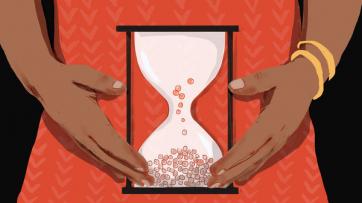 Egg freezing is becoming more common among women who have concerns about their future fertility. Many women prefer to 'play it safe' and freeze their eggs while they are younger just in case they encounter fertility issues down the road. In order to determine whether women should or should not consider freezing their eggs at a young age, the ovarian reserve test was developed. This is a test can be administered to women when deciding whether they should freeze their eggs or whether they still have time to have a baby down the road. However, as great as it can be to know this information when making important life decisions, the ambiguity of the tests may mislead women--causing some to feel pressured to freeze their eggs too early or miss their window to conceive naturally--and there are also issues with the tests reliability.
Egg freezing is becoming more common among women who have concerns about their future fertility. Many women prefer to 'play it safe' and freeze their eggs while they are younger just in case they encounter fertility issues down the road. In order to determine whether women should or should not consider freezing their eggs at a young age, the ovarian reserve test was developed. This is a test can be administered to women when deciding whether they should freeze their eggs or whether they still have time to have a baby down the road. However, as great as it can be to know this information when making important life decisions, the ambiguity of the tests may mislead women--causing some to feel pressured to freeze their eggs too early or miss their window to conceive naturally--and there are also issues with the tests reliability.
Women are born with all of the eggs they will ever have--roughly 1-2 million--and this egg supply depletes over time until menopause, when a woman's eggs are gone. As the quantity of eggs diminishes, the quality also deteriorates--two factors that can impact fertility. The ovarian reserve test was not developed with egg freezing in mind. Rather, the test was initially conceived to measure egg supply in women who were struggling to get pregnant. Women who still had many eggs left, for instance, could respond well to ovarian stimulation and in vitro fertilization to achieve an embryo. The issue is that the test relies on analyzing levels of anti-Mullerian hormone (AMH) in women to discern if a woman's ovaries would respond well to drugs--and AMH levels can have drastic ranges from woman to woman. This means the results of this test can be incredibly difficult to analyze when there is such a wide variance of AMH levels among women of the same age. Due to the high variance of this test, it is not recommended yet for routine gynecologic exams.
Source: NPR
